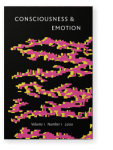Vol. 1:1 (2000) ► pp.139–166
On the intrinsic nature of states of consciousness
Further considerations in the light of James’s conception
How are the states of consciousness intrinsically so that they all qualify as “feelings” in William James’s generic sense? Only a small, propaedeutic part of what is required to address the intrinsic nature of such states can be accomplished here. I restrict my topic mainly to a certain characteristic that belongs to each of those pulses of mentality that successively make up James’s stream of consciousness. Certain statements of James’s are intended to pick out the variable “width” belonging to a stream of consciousness as it flows. Attention to this proposed property brings me to a discussion of (a) the unitary character of each of the states of consciousness however complex they may frequently be and (b) how to conceive of their complexity without recourse to a misleading spatial metaphor.
Cited by (2)
Cited by 2 other publications
This list is based on CrossRef data as of 1 july 2024. Please note that it may not be complete. Sources presented here have been supplied by the respective publishers. Any errors therein should be reported to them.
